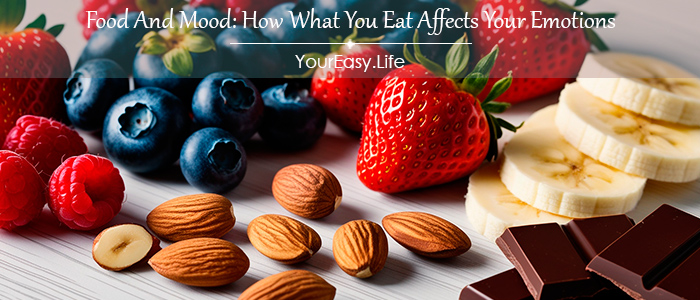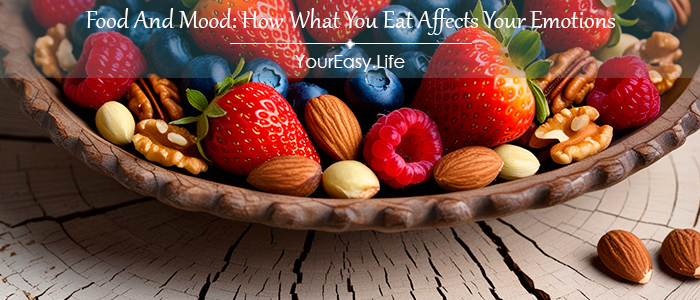Have you ever noticed how sometimes after eating a certain type of food, you feel happier and full of energy, while other foods leave you feeling tired and even irritable? We often think that our mood is influenced by external circumstances, stress, or success at work or in our personal lives, but few of us realize how deeply food and mood are connected. What if our food is not just a source of energy for our body but also the key to our emotional well-being?
Scientific research increasingly confirms that what we eat can affect our ability to cope with stress, regulate anxiety levels, and even combat depression. For example, about 95% of serotonin, a crucial hormone responsible for our happiness, is produced in the gut. And the health of our gut is directly linked to what we put on our plates every day.
Food and mood — it’s real chemistry. Some foods stimulate the production of happiness hormones like serotonin and dopamine, while others disrupt the brain’s chemical balance, leading to irritability, apathy, and even depression. The problem is that many of us still don’t fully understand this connection. We often focus on calories or how food affects our figure but forget to consider how it impacts our inner state. Food and mood is not just a phrase; it’s a reality we should all be thinking about.
So, what should we do? Which foods should we choose to improve our well-being and stay in a good mood? What foods should we add to our diet to maintain emotional balance, and which ones should we avoid to steer clear of fatigue and irritability? The answers to these questions can be found by carefully examining how different categories of foods affect our brain and body.
In this article, we’ll dive into two main questions: which foods can worsen our mood and why, and which foods, on the contrary, help us feel better and more energized. You’ll learn how to include the right ingredients in your diet to not only take care of your health but also greet each day with a smile. After all, proper nutrition is not only the path to physical health but also the key to good mood and emotional well-being.
Foods That Worsen Your Mood
Have you ever noticed that after eating certain foods, you feel irritated, tired, or just not yourself? The thing is, some foods can negatively impact our brain and overall well-being because food and mood are closely intertwined. Let’s break down which foods you should monitor or eliminate to improve your mood and save your energy.
1. Artificial Sweeteners
Many of us think that products labeled “sugar-free” or “diet” are a great way to cut calories, but they can harbor hidden dangers like artificial sweeteners, such as aspartame, which directly affects the production of neurotransmitters in the brain.
How it works: Aspartame can disrupt the production of serotonin and dopamine — hormones that control our mood. As a result, instead of the expected mood boost, you might feel irritable, anxious, and even develop headaches. Studies show that regular consumption of artificial sweeteners is associated with an increased risk of depression and anxiety disorders.
Tip: Try replacing diet drinks and sugar-free products with more natural alternatives like tea with honey, fruit-infused water, natural juices, or just plain water. You’ll notice how your mood stabilizes, and your energy levels won’t drop as sharply.
2. Trans Fats
The connection between food and mood can easily be seen with trans fats, which are found in baked goods and processed foods. Do you love pastries, cookies, and ready-made baked goods? They may be delicious, but if you eat them frequently, it’s worth being cautious.
How it works: Trans fats trigger inflammatory processes in the body that can impair brain function and reduce its ability to regulate mood. Research shows that people who consume a lot of trans fats are 48% more likely to suffer from depression. Imagine — your favorite pastry could be the cause of your apathy!
Tip: Try swapping out baked goods that contain trans fats for homemade versions with healthy fats like coconut oil or avocado oil. Not only are they healthier, but they also help maintain a stable emotional state.
3. Caffeine In High Doses
Many of us can’t imagine starting the day without a cup of coffee. But what happens when that one cup turns into three, four, or five? Excessive caffeine consumption can lead to nervousness and anxiety instead of giving you the energy boost you need.
How it works: Caffeine stimulates the nervous system, but when taken in too high a dose, it overwhelms it, leaving you feeling irritable, anxious, and also suffering from sleep disturbances, which only worsen your fatigue. Long-term consumption of high doses of caffeine leads to mood swings and reduces the ability to handle stress.
Tip: Try limiting yourself to one or two cups of coffee a day. If you need more energy, drink more water or switch to green tea, which contains less caffeine but still gives you a boost. This way, you’ll avoid unnecessary anxiety and feel more balanced.
4. Processed Meat
Sausages, bacon, and other types of processed meats are common foods for many of us. But did you know that they can significantly affect your mood? These foods are high in sodium, preservatives, and saturated fats, which harm both your body and brain.
How it works: Processed meats cause inflammatory processes in the body and can alter the brain’s chemical balance. Scientists have established a link between these foods and mood, showing that regular consumption of processed meats is associated with a higher risk of depression and mood swings. The large amounts of salt found in sausages and bacon can also negatively affect your cardiovascular system, which in turn affects brain function.
Tip: Replace sausage and bacon with natural meats like chicken or turkey. Grill or bake them — it’s much healthier and will help you maintain a stable mood.
5. White Bread And Refined Carbohydrates
Have you ever noticed how after eating a slice of white bread or a bowl of pasta, you initially feel a surge of energy, but soon after, you’re tired and sluggish again? This is because white bread and other refined carbs cause sharp spikes in blood sugar levels.
How it works: Simple carbs are digested quickly, causing a rapid energy spike, followed by an equally sharp drop in blood sugar levels, leading to fatigue and apathy. This is yet another example of how food and mood are interconnected. Such sugar fluctuations can lead to feelings of irritability and even depression. Regular consumption of white bread and refined products can result in chronic mood swings.
Tip: Swap out white bread and pasta for whole grain options like quinoa, brown rice, or whole grain bread. These foods are digested more slowly, helping maintain steady energy levels, which improves mood and concentration.
6. Salt And Overly Salty Foods
We think of salt as just a seasoning, but in reality, too much of it can significantly impact how we feel. Chips, crackers, canned goods, and ready-made meals contain too much salt, which can harm the nervous system.
How it works: Excessive salt intake raises blood pressure, which restricts blood flow to the brain and impairs cognitive functions, causing headaches, irritability, and even mental sluggishness. Moreover, too much salt contributes to dehydration, which negatively affects your mood and overall well-being.
Tip: Gradually reduce the amount of salt in your diet. Start by eating salty snacks like chips and crackers less frequently, and replace them with fresh vegetables or unsalted nuts. Your blood vessels and mood will thank you!

Foods That Improve Your Mood
You know that feeling when, after eating something tasty and healthy, you feel lighter, more energetic, and even happier? That’s no coincidence! If you want to lift your mood and feel better every day, start with your diet because food and mood are directly connected: certain foods can stimulate the production of “happiness hormones” and enhance your emotional tone. Let’s take a look at which foods help you combat bad moods and bring you a sense of joy and inner calm.
1. Fish Rich In Omega-3 Fatty Acids
Fatty fish like salmon, sardines, and mackerel are rich in omega-3 fatty acids, which help your brain work at full capacity. These healthy fats not only support heart health but also play a crucial role in mood regulation.
How it works: Omega-3 fatty acids help reduce inflammation in the body, which benefits the brain. They promote the production of serotonin, the “happiness hormone,” which helps fight anxiety and depression. Studies show that people who regularly eat fish are less likely to suffer from depression and feel more emotionally stable.
Tip: Try to include fatty fish in your diet at least two or three times a week. If you don’t like fish, consider fish oil supplements or flaxseed oil, which also contain omega-3s.
2. Fermented Foods (Yogurt, Kefir, Kimchi)
Fermented foods like yogurt, kefir, sauerkraut, or kimchi are rich in probiotics — beneficial bacteria that support the balance of gut flora. And the health of your gut is directly connected to your happiness level. Once again, food and mood go hand in hand.
How it works: Our gut is often called the “second brain,” and this is not just a metaphor. About 95% of serotonin is produced in the gut, and probiotics help keep the gut flora healthy. When your gut is in good shape, your brain functions better, and you feel calmer, more energetic, and happier.
Tip: If you’re not a fan of fermented foods, try adding yogurt to smoothies or use sauerkraut as a side dish. This is a great way to maintain both health and good mood with minimal effort.
3. Nuts And Seeds (Especially Almonds, Walnuts, Flaxseeds)
Nuts are a real treasure trove of nutrients that help your brain function better, as they are rich in magnesium — a mineral known for its anti-stress properties. Consuming magnesium helps you relax, reduce tension, and improve mood. Again, we see how food and mood are closely linked through minerals and micronutrients.
How it works: Magnesium regulates the activity of neurotransmitters in the brain responsible for our emotional state. Low magnesium levels can cause irritability and anxiety, but sufficient amounts help you manage stress.
Tip: Add a handful of nuts to your daily snack or sprinkle flaxseeds on your morning oatmeal. Not only is it delicious, but it’s also beneficial for your nervous system!
4. Dark Chocolate
Chocolate isn’t just a dessert; it’s a real “happiness pill,” but it’s important to make the right choice. Dark chocolate with a high cocoa content (70% and above) has amazing properties that can lift your mood and improve concentration.
How it works: Dark chocolate contains flavonoids — antioxidants that improve blood circulation in the brain, enhancing its performance. It also stimulates the production of serotonin and endorphins, responsible for feelings of joy and pleasure. But remember moderation: just 30 grams a day is enough to feel the effect.
Tip: If you’re craving something sweet, opt for a piece of dark chocolate. It’s a healthier alternative to milk chocolate or sugary desserts. Enjoy every bite, knowing it’s both delicious and good for you!
5. Whole Grain Foods (Oats, Quinoa, Brown Rice)
When you’re feeling low on energy, consider whole grain foods. Oatmeal, quinoa, and brown rice are rich in complex carbohydrates, which are digested slowly and provide a steady supply of energy, helping to maintain a stable mood and energy throughout the day.
How it works: Complex carbohydrates from whole grains promote the production of serotonin, which helps manage mood swings and feelings of fatigue. Unlike simple carbohydrates (like sugar), whole grains keep your blood sugar levels stable, preventing sharp mood swings.
Tip: Try starting your morning with oatmeal or quinoa — they’ll give you an energy boost and a positive mood for the whole day. And instead of white rice, choose brown rice — it’s a simple but beneficial change!
6. Fruits And Berries
Fruits and berries are not only delicious but also incredibly beneficial for our brain. The connection between food and mood is clear here: berries and fruits are rich in antioxidants that protect brain cells from stress and help maintain mental clarity and energy. For instance, bananas contain vitamin B6 and the amino acid tryptophan, which help the brain synthesize serotonin, as well as potassium, which supports nervous system health. Bananas, it turns out, are a natural antidepressant. You can learn why you sometimes crave bananas in the article Why Am I Craving Bananas?.
How it works: Antioxidants fight inflammation in the brain and help improve memory, concentration, and mood. Studies show that regular consumption of berries can reduce the risk of depression and even improve cognitive functions.
Tip: Add a handful of berries to your morning oatmeal, smoothie, or just enjoy them plain. Not only is it healthy, but it’s also tasty!
Conclusion
As you can see, food and mood are closely linked. What we eat every day affects how we feel, our emotions, and even how we perceive the world around us. Your balanced diet is the first step toward improving your emotional state. Start small: add more healthy foods to your meals and try to reduce the intake of those that negatively affect your mood.
Remember, changes in diet are an investment in your emotional well-being. If you take care of your body, it will reward you with good mood and energy.





